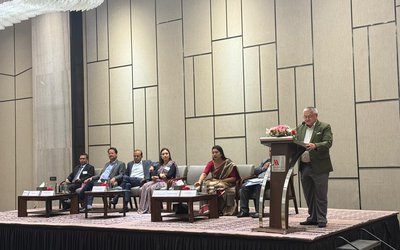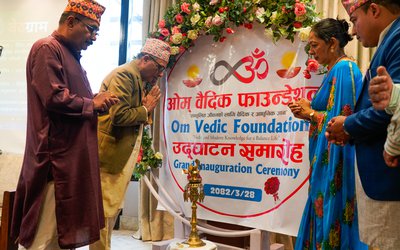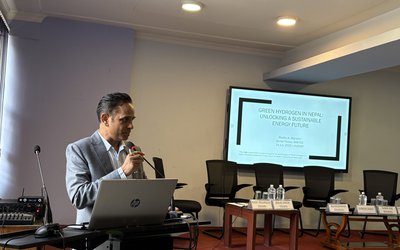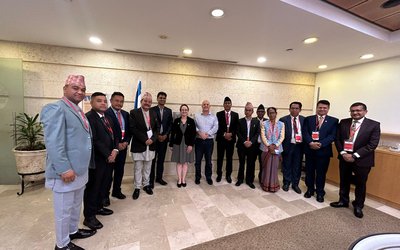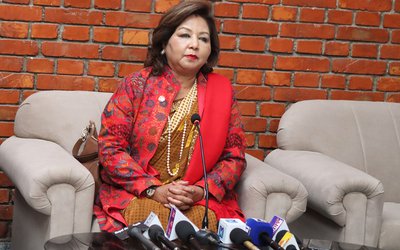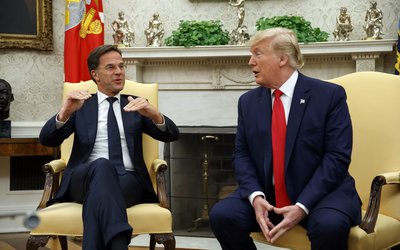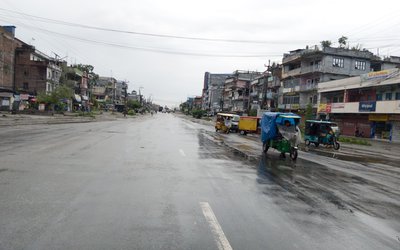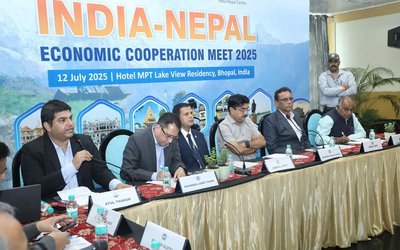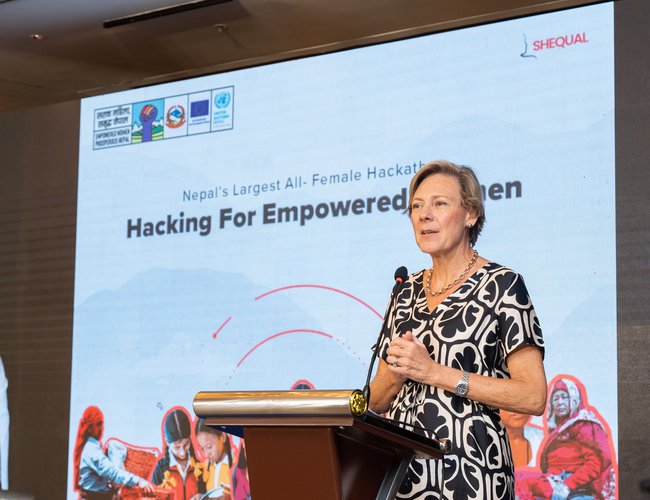
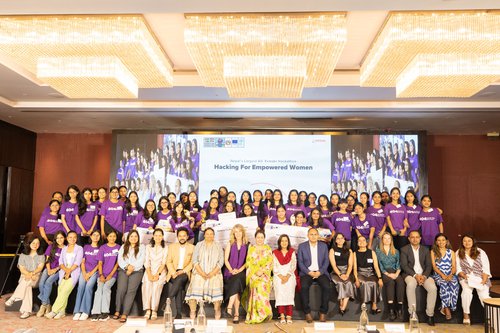
Veronique Lorenzo, Ambassador of the European Union to Nepal, emphasized the importance of digital innovation in economic growth and women's empowerment.
She highlighted the need for accessible and affordable technology for all, especially marginalized communities. Ambassador Lorenzo praised the hackathon for providing a platform for women to create digital solutions based on their real-life experiences.
Patricia Fernandez-Pacheco, Country Representative of UN Women Nepal stressed the significance of women's involvement in shaping the future and closing the gender digital divide. The event aimed to empower women in the tech sector and drive economic and social transformation in Nepal.
Similarly, Melisha Ghimire and Astha Sharma, Co-Managing Directors of Shequal Foundation, emphasized that the hackathon is not just a competition but a movement. They believe it is a way to empower young women by placing them at the forefront of innovation, leadership, and impact. The goal is not only to create tech solutions but also to instill belief, visibility, and power in these women.
Shequal Foundation, in collaboration with the EU-UN joint program Empowered Women Prosperous Nepal (EWPN), recently organized Nepal's Largest All-Female Hackathon. This three-day event focused on women's economic empowerment and aimed to bring together innovation, inclusion, and impact for women in technology. The program has just concluded.
The residential hackathon featured 16 all-women teams comprising 48 participants from various parts of Nepal. These teams worked together to address critical social and economic challenges in the country through technological solutions.
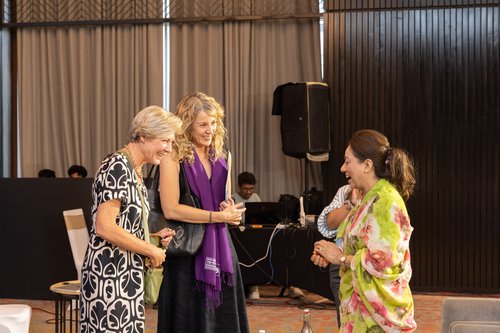
The hackathon, themed "Hacking for Empowered Women," tackled issues such as unpaid care work, access to financial services, digital literacy, and gender-responsive health.
From July 9-10, participants collaborated intensively, coded, received mentorship, and solved problems with the guidance of 20 expert mentors and industry professionals. The event concluded with a final pitch day where six teams presented their innovative tech solutions to a panel of judges, with three teams emerging as winners.
SewaDit was declared the winner for their innovative digital platform that tracks unpaid care work through task-based points, verification, and monthly reports to make invisible labor visible for recognition, support, and economic inclusion. The team was from Butwal and consisted of Ms. Roshni Neupane, Ms. Aakritee Parajuli, and Ms. Supriya Shrestha.
Healing Hands was named the First Runner-Up for their solution "Care Bridge," a web platform connecting female caregiving students with those in need of unpaid care. The platform matches based on skills and availability, tracks experience in a verifiable Care Portfolio, and provides real-world training, community support, and resume-level recognition. The team was from Jhapa and included Ms. Aiswarya Pokharel, Ms. Ayushma Pokhrel, and Ms. Hemkala Thapa.
June was the Second Runner-Up for their solution "HeritEdge," a personalized, gamified cultural storytelling platform that empowers local artists, engages youth with AR and AI-driven experiences, and supports regional languages. The team was from Kathmandu and consisted of Ms. Kritika Acharya, Ms. Astha Ghimire, and Ms. Simran Gurung.
The teams presented solutions to address real-world challenges in Nepal, such as care gaps, low female employment, skilling and employment opportunities, digital finance and budgeting tools, gender-responsive healthcare, digital inclusion, accessibility to e-commerce platforms, cultural preservation using AR, and recognition of unpaid care work.
These ideas, developed with empathy and purpose to drive long-term change for women in Nepal, were evaluated by a panel of judges including Mukesh Regmi, Bhawani Rana, Aashish Dhakal, Pramila Acharya Rijal, Mona Sherpa, Tripti Rai, Rajendra Luitel, Salina Nakarmi, Pranisha Shrestha, and Sahana Bajracharya, representing various government institutions, development agencies, and private sectors.
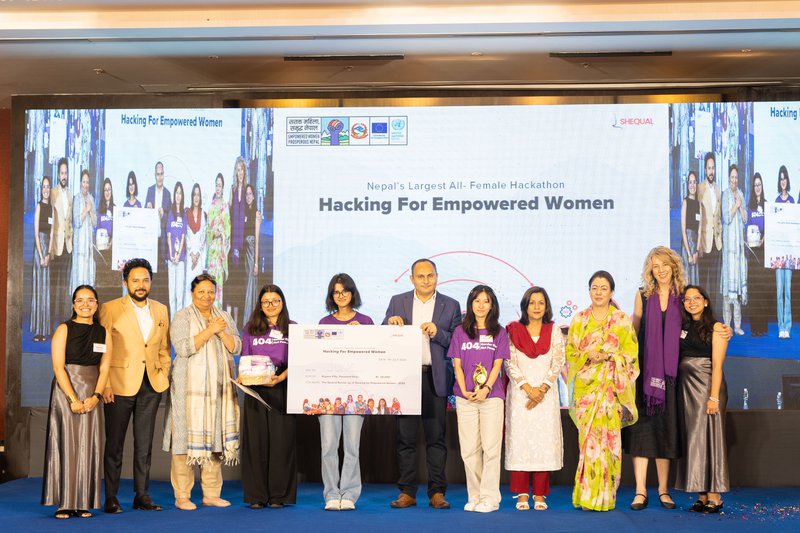
UN Women's press release stated that the hackathon was part of a series of impactful pre-events, including IDEATHON 2025, a Human-Centered Design Workshop, and Hack the Narrative, engaging over 1000 young women in ideation, storytelling, and user-focused innovation.
UN Women took the lead in designing and organizing the Hackathon focused on 'Women's Economic Empowerment, including unpaid care work. This initiative represents a significant step towards creating inclusive digital environments where women can take the lead, innovate, and succeed.
EWPN (Empowered Women, Prosperous Nepal) is a collaborative four-year initiative (2023–2026) involving the Government of Nepal, the European Union, and the United Nations to promote gender equality and inclusive economic development. The program is being carried out by four UN agencies (ILO, UNFPA, UNICEF, and UN Women) in Madhesh, Karnali, and Sudurpaschim Provinces, in partnership with various levels of government.
Likewise, Shequal Foundation is a non-profit organization led by youth and women dedicated to creating a fair, inclusive, and just society. Operating in all 7 provinces of Nepal, Shequal Foundation engages individuals, particularly girls and women aged 9 to 40, through a range of programs and initiatives.
With a strong emphasis on gender equality, economic empowerment, and community change, Shequal Foundation provides safe spaces and opportunities for girls and women throughout Nepal to lead, learn, and thrive. Through grassroots projects and national campaigns, Shequal Foundation combines innovation with advocacy to challenge norms, alter perceptions, and drive systemic transformation.
- Nepal Needs a Coordinated Security Mechanism and De-radicalisation Program to Counter Terrorism
- Jul 15, 2025
- FOODMANDU Committed to Make ‘Life Ajhai Better’
- Jul 15, 2025
- Om Vedic Foundation Inaugurates with Grand Ceremony
- Jul 15, 2025
- Weather Forecast: Generally Cloudy Across The Country heavy rain in one or two places in Koshi,Gandaki, Lumbini, and Karnali Province
- Jul 15, 2025
- Green Hydrogen in Nepal: Unlocking a sustainable energy future
- Jul 14, 2025
